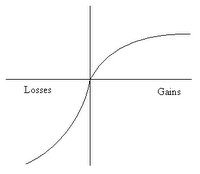Although, I had read about this theory some time back, it has suddenly captured my interest again. The Prospect Theory came out of the work of two psychologists - Kahneman and Tversky - to explain why people make decisions that conflict with the Expected Utility Theory. To put it in simpler terms, the theory tries to explain why people behave irrationally in the face of choices.
The expected utility hypothesis is the hypothesis that the utility of an agent facing uncertainty is calculated by considering utility in each possible state and constructing a weighted average. The weights are the agent's estimate of the probability of each state.
The crux of the prospect theory is this: We have an irrational tendency to be less wil ling to gamble with profits than with losses. This means selling quickly when we earn profits but not selling if we are running losses. [Tvede 1999]. This can be represented by a value function as shown on the right. As shown, losses hurt more than gains satisfy.
ling to gamble with profits than with losses. This means selling quickly when we earn profits but not selling if we are running losses. [Tvede 1999]. This can be represented by a value function as shown on the right. As shown, losses hurt more than gains satisfy.
The key difference between the two theories is that the expected utility hypothesis describes how people should behave (prescriptive) when faced with choices, while the prospect theory aims to describe how people actually behave (descriptive).
Simple enough isn't it? But consider the implications:
More about prospect theory.
The crux of the prospect theory is this: We have an irrational tendency to be less wil
 ling to gamble with profits than with losses. This means selling quickly when we earn profits but not selling if we are running losses. [Tvede 1999]. This can be represented by a value function as shown on the right. As shown, losses hurt more than gains satisfy.
ling to gamble with profits than with losses. This means selling quickly when we earn profits but not selling if we are running losses. [Tvede 1999]. This can be represented by a value function as shown on the right. As shown, losses hurt more than gains satisfy.The key difference between the two theories is that the expected utility hypothesis describes how people should behave (prescriptive) when faced with choices, while the prospect theory aims to describe how people actually behave (descriptive).
Simple enough isn't it? But consider the implications:
- People hold on to stocks that have taken a beating hoping that they would go up some day
- People tend to sell off stocks sooner when they are going up - (leading to frequent stock market "corrections" as TV channels put it)
- People place a higher value on something they own, when compared to the same thing if they didn't own it. (People prefer certain gains)
- Your boss is more likely to approve your application for leave if it is in the form of a series of applications for 2 days each every 20 days over a 60 day period as opposed to a stretch of 6 days at a time.
- A person who owns an apartment will estimate its market rate (for rent) to be higher than what he would pay were he to take it on rent himself.
More about prospect theory.
No comments:
Post a Comment